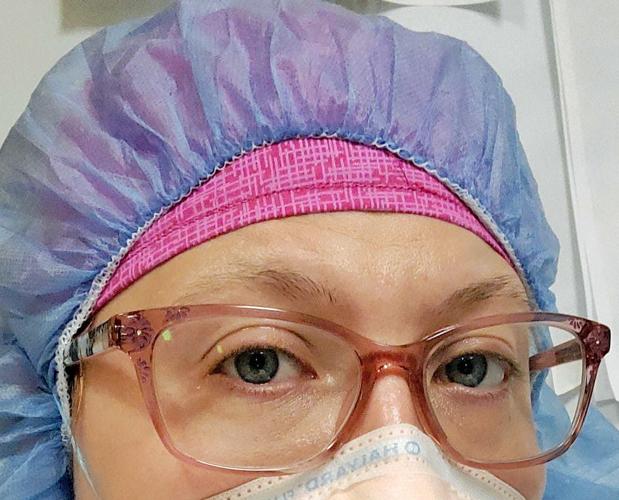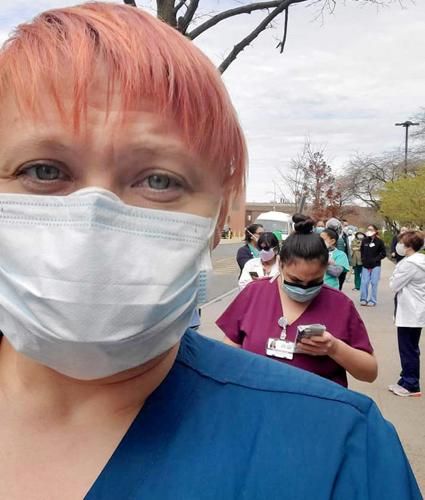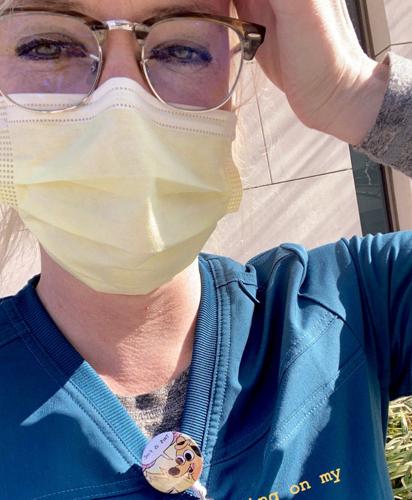Amy Burke had never been east of Texas when she arrived in New York City earlier this month, ready to help people sick or dying from COVID-19.
“Patient-wise, this is the sickest group of people I’ve ever seen,” the Tucson respiratory therapist said during a telephone call from Brooklyn last week. “I’ve never seen anything like it before. Nobody has.”
Burke was unsure when she first considered a temporary move to New York to run ventilators in one of the nation’s hardest-hit areas. Conversations with her best friend and her husband changed her mind. Both have military backgrounds, and they encouraged her to think of working in New York as a deployment.
And when Burke landed at John F. Kennedy Airport April 10, in a plane full of health-care workers from all over the country, it did feel that way, she said, like they were soldiers on a shared mission.
“When we landed, I wasn’t scared — I was excited,” she said. “I love my job and I’ve trained for this my whole life.”
It’s a feeling that’s continued to grow as she puts in her days at a Brooklyn hospital.
“We got into medicine because we wanted to help people,” she said. “It really feels like we’re in combat together.”
Burke, 33, said she’s fallen in love with New York City, and especially Brooklyn.
“Brooklyn is a magical city, a true melting pot,” she said. “It’s such a wonderful, wonderful place.”
People are so appreciative of health-care workers being there at this heartbreaking time, she said.
Each day, there’s a food truck outside the hospital offering free breakfast and lunch.
“They are treating us like superheroes,” she said, “and we’re just doing our job.”
Burke has been a respiratory therapist since she was 20, working in intensive care units and with asthma and cystic-fibrosis patients, but she said she’s never experienced anything like what she’s seeing in Brooklyn.
The hardest part, she said, is reaching a point where there is nothing left to do to help their patients.
“Sometimes it feels as though we are just waiting for them to die so we can clean up the vent and try to save the next patient who needs it,” she wrote on a private social media post she shares with family and friends.
“The amount of people who die is astonishing. You try not to think about the patient that you just withdrew care from while you check on the person sharing the room with them who’s also vented.”
One day, five of her patients died.
“It’s a very human thing to die. We hold their hand and try to comfort them, but it’s not the same as being with family or friends, of course,” she said. “We’re going to need help with our mental health after this is done.”
The bodies of people who died pile up sometimes, she said, before being moved to a semitrailer that’s parked behind the hospital.
Burke said she’s doing OK so far, although she has had trouble sleeping sometimes. Her hands have started shaking a bit in the evenings, perhaps her body’s way of letting off stress.
That stress is sometimes compounded by what she hears that people outside of New York are doing and saying about state shutdowns.
“COVID-19 is a horrible, horrible disease and it’s a little frustrating and heartbreaking to see when we’re here trying to keep people alive and protect ourselves,” she said. “It’s been a hot topic in the hospital. We’re all upset about it.”
But when she starts to think about that kind of thing too much, she counters it with the good stories, including one she read recently about people in a manufacturing plant who worked for 28 days straight making medical masks.
She said it’s hard for people to understand how serious this new virus is unless it affects them personally.
“If you know a health-care worker who has been working in a COVID unit and you have a conversation about it, then opinions start to shift,” she said.
The people she works with, strangers just days ago, feel like family now.
“They are among the most amazing human beings I’ve ever met,” she said. “It brings you together, doing this work. These are my brothers and sisters in health care.”
Burke was joined back east by a longtime friend, Kim Oakden, who is from Tucson but now lives in Phoenix. Oakden is at a hospital on Long Island.
The women have known one another since they attended Sahuaro High School together, graduating one year apart.
“She arrived first,” Burke said. “Then she called and said, ‘It’s crazy. Come out here so I can see a familiar face.’”
Oakden, who is also a respiratory therapist, arrived April 6 and will be going back at the end of May.
“Honestly, the whole thing has just been surreal,” Oakden said. “I don’t know if it’s a coping mechanism or not, but I try not to think about it too much.”
The friends have seen each other a couple of times so far, a half-hour drive between them.
Burke’s parents, Sissie and Eric Schrader of Tucson, are worried about their daughter but are also proud of her.
Sissie Schrader said when Burke told her she was going to New York City to work, she didn’t know if she was going to cry first or get sick to her stomach.
“She’s very brave, but this is terrifying,” Sissie Schrader said. “We’re extremely proud of her. She’s always been a gutsy girl. She has a heart of gold and she’s damn good at what she does.”
Photos for April 23: Tucson gets by during Coronavirus Pandemic
Tucson, coronavirus
Updated
Erika Munoz, owner of Seis Kitchen, hands over a bag of meals to Michael Gallagher Carondelet, a registered nurse at St. Joseph's Hospital, to distribute to other nurses and hospital workers, on April 23, 2020. The donation was made in conjunction with A+C (Athletes/Artists+Causes) Foundation's “Project Frontline.” In two deliveries, 400 meals (200 poc chuck chicken and 200 puerco verde burritos) will be given to medical personnel at Carondelet St. Joseph’s Hospital. The particular donation was made possible by the Houston Astros' Pitching Coach Brent Strom, who lives in Tucson.
Tucson, coronavirus
Updated
Hospital workers wheel in carts full of catered meals donated by Seis Kitchen to Carondelet St. Joseph's Hospital, on April 23, 2020. The donation was made in conjunction with A+C (Athletes/Artists+Causes) Foundation's “Project Frontline.” In two deliveries, 400 meals (200 poc chuck chicken and 200 puerco verde burritos) will be given to medical personnel at Carondelet St. Joseph’s Hospital. The particular donation was made possible by the Houston Astros' Pitching Coach Brent Strom, who lives in Tucson.
Tucson, coronavirus
Updated
Kristi Hall, a sixth grade teacher at Desert Sky Middle School, participates in planning a lesson with a fellow teacher on Zoom, at her home on April 17, 2020. Schools in the Vail School District are supposed to open in July due to their year-round school calendar. Plans are being made for the possibility of students returning to the physical classroom.
Tucson, coronavirus
Updated
Bry Kelley, a warehouse assistant, places a pallet filled with food down next to other items donated to the Community Food Bank of Southern Arizona on on April 21, 2020. Forty-one thousand pounds of flour, pasta and canned goods were donated by The Church of Jesus Christ of Latter-day Saints. The donation is part of an ongoing global effort by the church to address immediate needs of people and orgainzations due to the coronavirus disease (COVID-19) pandemic.
Tucson, coronavirus
Updated
A pallet of food is placed down next to other items donated to the Community Food Bank of Southern Arizona on on April 21, 2020. Forty-one thousand pounds of flour, pasta and canned goods were donated by The Church of Jesus Christ of Latter-day Saints. The donation is part of an ongoing global effort by the church to address immediate needs of people and orgainzations due to the coronavirus disease (COVID-19) pandemic.
Tucson, coronavirus
Updated
Christian Bergman, 4th year University of Arizona medical student, takes the temperature of a patient outside the Z Mansion, 288 N. Church Ave., in Tucson, Ariz., on April 19, 2020. Medical students from the University of Arizona and other universities volunteer to help the homeless population with the growing concerns of Coronavirus Disease (COVID-19) within the homeless population. “This is a vulnerable population in our community; they can’t defend themselves in a society already running short on supplies and resources,” said Bergman. Medical students and medical personal help by giving out food, drinks with electrolytes and masks to the homeless. Those who are sick, medically impaired or have been exposed to those with COVID-19 are isolated outdoors in tents on the property. As of Sunday April 19, there were 13 individuals whom are isolated in tents.
Tucson, coronavirus
Updated
Lekha Chesnick, 1st year medical student at Burrell College of Osteopathic Medicine, talks with a homeless man (whom choose to not give his name) outside of the Z Mansion, 288 N. Church Ave., in Tucson, Ariz., on April 19, 2020. Medical students from the University of Arizona and other universities volunteer to help the homeless population with the growing concerns of Coronavirus Disease (COVID-19) within the homeless population. Medical students and medical personal help by giving out food, drinks with electrolytes and masks to the homeless. Those who are sick, medically impaired or have been exposed to those with COVID-19 are isolated outdoors in tents on the property. As of Sunday April 19, there were 13 individuals whom are isolated in tents.
Tucson, coronavirus
Updated
Christian Bergman, 4th year University of Arizona medical student, checks on a patient outside the Z Mansion, 288 N. Church Ave., in Tucson, Ariz., on April 19, 2020. Medical students from the University of Arizona and other universities volunteer to help the homeless population with the growing concerns of Coronavirus Disease (COVID-19) within the homeless population. “This is a vulnerable population in our community; they can’t defend themselves in a society already running short on supplies and resources,” said Bergman. Medical students and medical personal help by giving out food, drinks with electrolytes and masks to the homeless. Those who are sick, medically impaired or have been exposed to those with COVID-19 are isolated outdoors in tents on the property. As of Sunday April 19, there were 13 individuals whom are isolated in tents.
Tucson, coronavirus
Updated
Elliott Dumont, owner of Roadrunner Bicycles, 6177 E. Broadway Blvd., works on a customer's bike on April 22, 2020. The coronavirus disease (COVID-19) has not slowed down bike shops. With many people at home, they are bringing bicycles for repairs and buying new ones for exercise. Dumont says he's booked out till the first week of May for tuneups on bikes.
Tucson, coronavirus
Updated
Elliot DuMont, owner of Roadrunner Bicycles, 6177 E. Broadway Blvd., far left, helps Ethan Sasz, far right, and his son, Evan, 10, with a mountain bike purchase on April 22, 2020. The coronavirus disease (COVID-19) has not slowed down bike shops. With many people at home, they are bringing bicycles for repairs and buying new ones for exercise. Dumont says he's booked out till the first week of May for tuneups on bikes.
Tucson, coronavirus
Updated
Marcella Montoya waits in her vehicle as general manger David Kessler brings out her order, as Bear Canyon Pizza serving their customers despite COVID-19 restrictions, April 22, 2020, Tucson, Ariz.
Tucson, coronavirus
Updated
Kitchen manger Koa Hoffmann tosses dough while working up a crust for a call-in order as he and few others keep cooking at Bear Canyon Pizza despite COVID-19 restrictions, April 22, 2020, Tucson, Ariz.
Tucson, coronavirus
Updated
Alvaro Enciso, a local artist, works in one of his studios at his home on April 9, 2020. Every Tuesday Enciso travels into the Sonoran desert to post crosses where migrants have died after crossing illegally over the U.S./Mexico border as part of a project he's titled Donde Mueren Los Suenos / Where Dreams Die. With the outbreak of the coronavirus disease his six year project is on hold and instead he works on other artwork at home.
Tucson, coronavirus
Updated
Dolly Spalding works on a pen and ink drawing in her apartment at the Redondo Tower Apartments on April 7, 2020. During her quarantine, Spalding has been creating drawings of all the Greek goddesses. She is collaborating with Emlyn Boyle, an artist from Ireland, and plans to publish a book with Boyle's writings.









